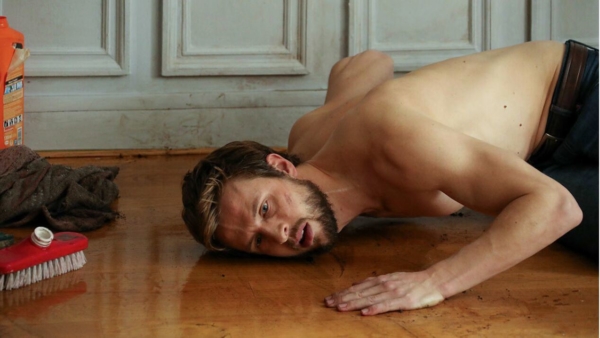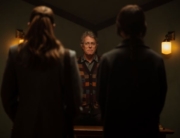“Dead is the norm now. I’m the one that’s not normal”
So says Sam (Anders Danielsen Lie), trapped in an apartment building surrounded by the undead. He is unburdening himself to his sole companion, Alfred (Denis Lavant), the unfortunate zombie trapped in the building’s elevator. All Sam wanted to do was collect some of his tapes from his ex-girlfriend, who decided to throw a massive party the night Sam comes by for them. Sam manages to head to a quiet back room where the tapes are boxed up, and his ex promises to come by for a talk. Sam falls asleep waiting for her and wakes up alone, among the undead.
This is the simple premise of The Night Eats the World. The aforementioned line of dialogue is an obvious homage to I Am Legend, but there are no intelligent zombies this time around. They just shamble about waiting for dinner to appear. Luckily, Sam lucked into a pretty sweet ornate apartment building in Paris to get trapped in, and to the screenplay’s credit, there is no “What’s going on?” moment. He opens the door and understands these are zombies and acts accordingly. He simply sets to the task of surviving. We watch as he methodically sets out to create a new home.
Sam doesn’t look like a model nor is he super intelligent or frankly very interesting. He is not a symbol for consumer culture or slacker indifference. He is a kind of a skinny everyman. Unlike other zombie movies, there’s no political or social undercurrent. The premise is simple: How does one survive? And how does one feel when one does? In this sense, the film is more an existential study than a horror movie.
Most of the running time is taken up with how Sam fills his days: how he catches rainwater, forages in apartments for food, keeps in shape. He also listens to a cassette of a young girl, who once lived in the building, as she attempts to learn English with the deep sorrow at the realization of what probably happened to her. This moment is one of the bravura scenes, and it’s simply a single static reaction shot. Lie does standout work. It’s hard to make boredom compelling, but he does so.
And then there’s Alfred, the zombie trapped in the lift, eternally hungry. Sam treats him like a harmless confidant as he is the only (once) human that is of no danger to him. Levant’s performance is an acting master class. He evokes the humanity of what Alfred once was as he stares at Sam with what looks like curiosity while his fingers are drumming the iron bars nervously because he has been hungry for a very long time.
Director Dominique Rocher doesn’t really retool the zombies. They shamble until they see prey, and then they are relentless. They grasp and grab, they neglect basic hygiene. But he makes one change that ups the creepy factor immensely. The zombies here are silent. When they attack, their mouths snap open and shut and they reach out desperately, but they don’t make a sound. It is a fantastically eerie distinction that gives them a childlike quality.
Eventually, events occur that jolt Sam out of his isolation and bring home the fact that he is living on limited resources. This is where the theme of The Night Eats the World comes to play. Sam has become comfortable, and that comfort can only last so long.







Leave A Comment